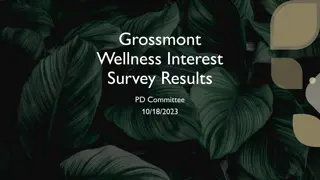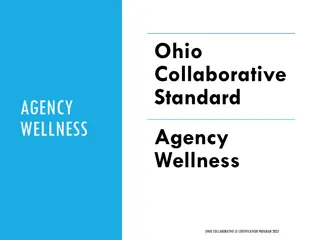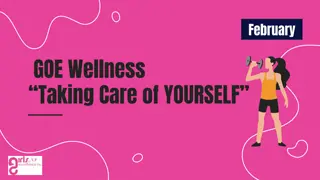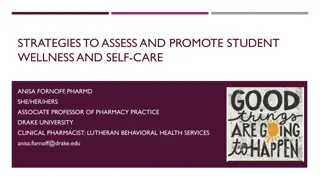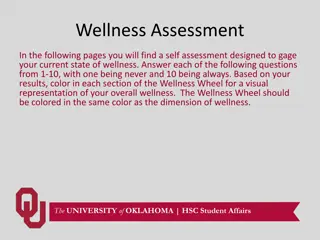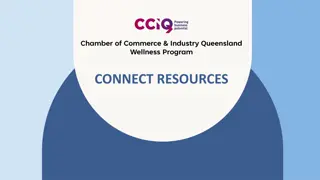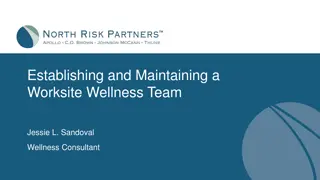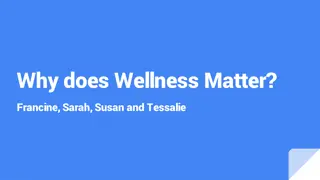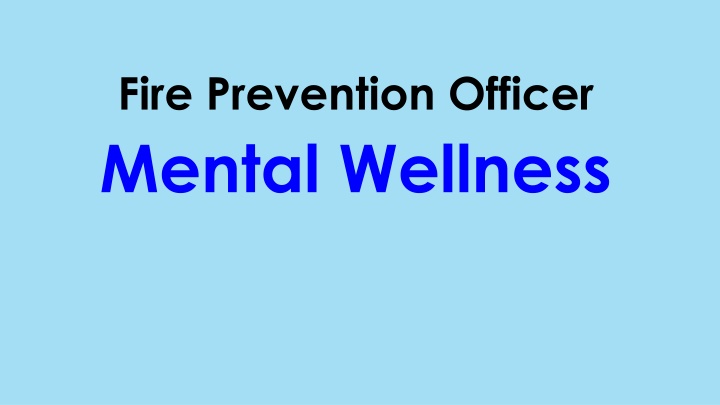
Mental Wellness and Stress Management for Fire Prevention Officers
Explore the importance of mental wellness and stress management for fire prevention officers, learn how stress affects mental health, identify warning signs of declining mental health, and discover strategies to maintain good mental health in a demanding work environment.
Download Presentation

Please find below an Image/Link to download the presentation.
The content on the website is provided AS IS for your information and personal use only. It may not be sold, licensed, or shared on other websites without obtaining consent from the author. If you encounter any issues during the download, it is possible that the publisher has removed the file from their server.
You are allowed to download the files provided on this website for personal or commercial use, subject to the condition that they are used lawfully. All files are the property of their respective owners.
The content on the website is provided AS IS for your information and personal use only. It may not be sold, licensed, or shared on other websites without obtaining consent from the author.
E N D
Presentation Transcript
Fire Prevention Officer Mental Wellness
Examples of FPO work stressors: Dealing with difficult customers Presenting unpopular information to the customer Applying the fire code to an unfamiliar application Issuing a POA Part 1 ticket to a customer Swearing information before a JP Fire Investigation Origin and Cause
Introduction What is mental health How stress affects mental health How your mental health affects you How to measure your mental health Training your brain to handle stress
Declining or Poor Change in ability to cope with stressors Changes in mood, increased anxiety, declines in physical health Can still function normally and may appear normal
Mental Illness It s like any health condition that affects the mind or body Difficulties in thinking, mood/ behaviour that interferes with daily life Must be formally diagnosed by psychiatrists or psychologists
Change the way you think We are all one bad day away from a mental illness.
Exposure to Stress Stress is wear and tear on the body caused by the need to adapt to changes or demands in the environment. Acute (short-term reaction to immediate threat) Chronic (longer-term ongoing situation)
Where does stress come from? External Stressors major life events, daily hassles Internal Stressors interpretation/ perception
So, what causes stress? Any event in life that a person finds threatening, difficult to cope with, or causes excessive pressure. Organizational Operational Personal
Organizational Stress Union/ Management Conflict Having to perform beyond experience/ abilities Keeping up with changes, technology Lack of training, information, support, advice Time pressures, deadlines Lack of clear objectives & role expectations
Operational Stress High inspection volume & time pressure Unfavourable working conditions, shift work Understaffed High effort/ low reward High level of complexity, skills, knowledge, expertise, problem solving Consequence of error is high
Personal Stress Relationship changes; marriage, separation, new child, sandwich generation Loss of family or friends Financial difficulties Loss of health or ability Work/life balance issues Transitions; new job, new town
LIFE STRESS Home and personal stress can have just as much impact as work (operational and organizational) stress
Changes in Mood Normal mood fluctuations Easily enraged Irritable Angry Excessive anxiety/panic Impatient Anxious Calm Nervous Pervasive Sadness Confident Depressed mood, numb Sadness
Changes in Thinking and Attitude Good sense of humour Noncompliant Displaced sarcasm Negative attitude Suicidal thoughts/intent Intrusive thoughts Recurrent intrusive thoughts/images Takes things in stride Sometimes distracted or loses focus on tasks Inability to concentrate, loss of memory or cognitive abilities Constantly distracted or cannot focus on tasks Ability to concentrate and focus on tasks
Changes in Behaviour and Performance Physically and socially active Withdrawal Decreased activity/ socializing Avoidance Absenteeism Tardiness Performing well Procrastination Can t perform duties/ tasks Decreased performance
Physical Changes Normal sleeping patterns Cannot fall/ stay asleep Trouble sleeping Restless sleep Changes in eating patterns Loss of appetite Good appetite No appetite Some tiredness or fatigue Feeling energetic Constant and prolonged fatigue or exhaustion Some lack of energy Maintaining a stable weight Fluctuations or changes in weight Some weight gain or loss Extreme weight gain or loss
Changes in Substance Use Limited alcohol consumption, no binge drinking Regular to frequent alcohol consumption, limited binge drinking Frequent alcohol consumption, binge drinking Regular to frequent binge drinking Addiction Limited/ no addictive behaviours Some regular to addictive behaviours Struggle to control addictive behaviours Significant trouble/impact (social, economic, legal, financial) due to substance use Limited to some trouble/impact (social, economic, legal, financial) due to substance use Increasing trouble/impact (social, economic, legal, financial) due to substance use No trouble/ impact (social, economic, legal, financial) due to substance use
Canadian Centre on Substance Abuse Low Drinking Guidelines 10 drinks a week for women, with no more than 2 drinks per day most days 15 drinks a week for men, with no more than 3 drinks a day most days
Canadian Centre on Substance Abuse Low Drinking Guidelines Reduce your risk of injury or harm by drinking no more than 3 drinks (ladies) and 4 drinks (men) on any single occasion. For these guidelines a drink means: 341ml (12oz.) bottleof 5% alcohol beer, cider or cooler 142ml (5oz.) glassof 12% alcohol wine 43ml (1.5oz) serving of 40% distilled
Quick Recap Mental Health Stress Impact of stress Mental Health Continuum Model
BIG Four Coping Strategies Four widely used techniques to cope with stress: SMART goal setting Mental Rehearsal/ Visualization Self-talk Tactical Breathing
1 - SMART Goal Setting Specific Who, What, Where Measurable - How much, How many, How long Attainable Can I do it Relevant Why Time-bound When
2 - Visualization Mentally prepare yourself for what ifs. Predict possible problems and work out a solution in advance Used to rehearse situations and strategies Train the brain
3 Self-talk Become aware of your self-talk Replace negative with positive Just because we say something doesn t mean it s true Use key words: FocusI ve got this I can do this I m trained for this
Using the BIG 4 Goal Setting Visualization (mental rehearsal) Self-Talk Tactical Breathing
Dealing with difficult customers Goal Setting Visualization (mental rehearsal) Self-Talk Tactical Breathing
Review What is mental health How stress affects mental health How your mental health affects you How to measure your mental health Training your brain to handle stress


